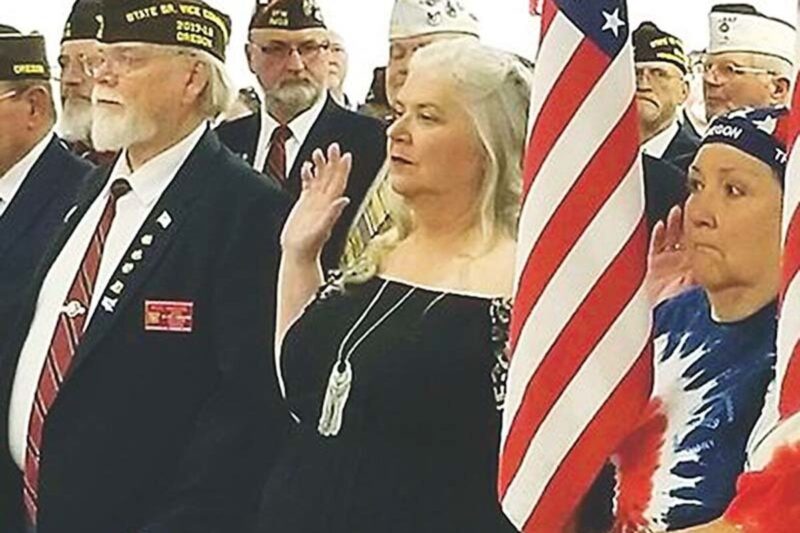Sarah Brown
When people think about the VFW building on Highway 20, they figure it’s “just some bar” where veterans and members get drunk, says Cathy Lindsay.
She’s tired of people thinking that and she’s working to change it.
“We do more than that,” she said. “We’re here to help our children, we’re here to help our veterans, and help our community.”
Lindsay, of Sweet Home, is president of the Department of Oregon of the Veterans of Foreign Wars Auxiliary. She heads 5,247 auxiliary members across the state who run several programs to help children, veterans, families of veterans, and others who just plain need help.
Her father, Jack Schmidt, was a veteran of the Navy, serving from 1958 to 1961, and joined Sweet Home’s VFW in the early 1990s. Following her dad’s lead, Lindsay went to an auxiliary meeting and liked the programs they were involved in, so she joined.
“I love this organization. I love what we do. I love the fact that we’re fighting for our veterans and our families if they need something,” she said.
It didn’t take long for Lindsay to get involved in leadership roles at the auxiliary. She worked her way through the organization’s local and district positions, but never expected to run for any state positions.
The impetus that got Lindsay involved at a higher level occurred when two state department officers snubbed her and her fellow district chairman from joining them at a lunch meeting, Lindsay said. They told her they couldn’t sit with them because she and her friend weren’t line officers.
“It made us mad, and I looked at (my friend) and I looked at this line and I said, ‘You know, one day we’re gonna be on this line and we’re not gonna be mean like you guys. We’ll let anybody sit with us.’ They all thought we were joking, and two years later we started running the line.”
Lindsay uses the word “ornery” to describe herself, but “resolute” may be a better word to illustrate a woman who is a rock when it comes to being kind to people.
She earns an income through home care and hospice, and works with developmentally disabled individuals, but it’s in her nature to help people, she said.
“I love when you walk in and you helped, and they got that big ol’ smile on their face. Or they got a grumpy face and you cut one of your jokes.”
As a member of VFW Auxiliary for more than 20 years, Lindsay uses the organization as a way to serve her community.
“Whatever the community needs me to help with, I’m here for them,” she said. “I try to be involved in our community and stuff because you need to let people see that you need to help other people.”
They loan out wheelchairs, hold blood drives, provide financial relief and grant opportunities to veterans and their families, help at hospitals, provide scholarship opportunities for kids, and provide supplies to families whose house caught fire.
Among other things, the VFW Auxiliary also actively helps pass and block legislation affecting veterans and their families, promotes Americanism, and creates programs to encourage youth to be more patriotic.
Her term as president lasts only a year, so Lindsay wants to make her time count. She set out to make mid-winter at the VFW more exciting (i.e., not “normal and boring”), and says her special project is addressing veteran PTSD and suicide.
Right now, the United States loses 22 veterans a day to suicide, and the VFW Auxiliary is looking into why that is. Are they not getting the right care when they get home? Should they not have even been in the military from the beginning? These are the questions they ask.
Lindsay realizes they can’t solve the problem in a year, but her goal is to understand what’s going on, figure out how to reach veterans who need help, and generally get the ball rolling so she can pass it on to her successor.
Meanwile, she encourages community participation in their fundraisers, and tries to increase membership and make things a bit more fun for her members.
“It’s just getting them back enthused in what’s going on, because we’re a dying breed right now.”
She believes a lot of people these days say they don’t have time to get involved, but for most people it’s not true.
“When you say you don’t have time, there’s always time for something. There’s always time for your community. There’s always time for a veteran.”





